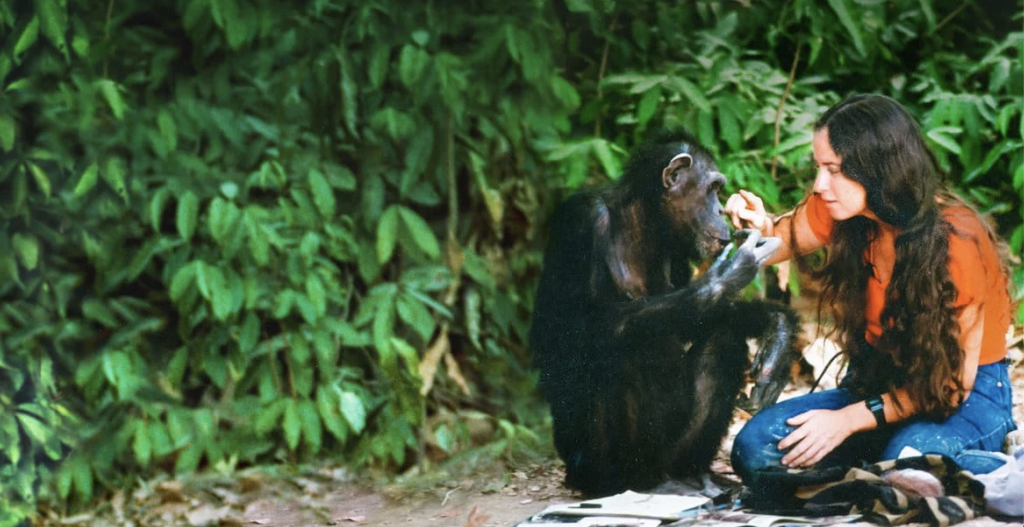You would think the new HBO Max documentary, “Lucy, the Human Chimp,” would be just another example of the blurring of the lines between human and animal and, in the process, a denigration of the divine plan of creation. It certainly began that way, as we learn of a chimpanzee named Lucy, acquired by husband and wife psychologists intent on exploring the concept of nature versus nurture.
The psychologist couple wanted to find out what would happen if they raised a great ape as a human child. Archival video shows a young Lucy dressed in human baby clothes, looking cute, and even human-like. A book followed, and a publicity tour describing how the couple’s “daughter” learned American sign language and showed signs of tremendous intelligence and personality. They bragged about her accomplishments like any proud parent would.
Just as human children reach the age of reason and exit the “garden,” so also it is with other species. For Lucy the chimpanzee, the issues that came to the surface as she matured were not only destructive to the furniture and personal property of her human “parents,” but soon became a threat to their physical well-being.
The chimpanzees we see in movies and shows are always young, immature specimens of the animal. Any old-time circus handler could have told the psychologist couple that adult chimpanzees are powerful and willful wild animals that can cause extreme harm to other primates they encounter, even primates with Ph.Ds.
The film is less about the psychologist couple and more about Janis Carter. She came into Lucy’s life as an undergraduate, when she answered an ad from Lucy’s “parents” seeking help with caring for her. An actor portrays Carter in the flashback sequences, as the real Carter acts as the film’s narrator and key on-screen chronicler of the epic journey she and the chimpanzee make.
By the time Carter first meets Lucy, the chimpanzee is being kept in a cage for most of the day due to her potential for mayhem. The psychologists still referred to Lucy as their daughter, but last I checked, parents who kept children in cages could usually expect a call from Child Protective Services.
Carter and Lucy form a deep bond just as the couple realize it is time to get their increasingly dangerous “daughter” out of their house. They find a reserve in Gambia that rehabilitates chimps raised in captivity with the hope of reintegrating them to the wild. Carter is asked to go with them for three weeks. She stays for years.
If paganism and nature worship had religious orders, Carter would have been a mother superior. She leaves her life in America behind; family and boyfriend all take a second seat to the needs of Lucy and the next experiment. She suffers isolation, deprivation, and sadness all for the sake of others, even if the others are chimps.
Eventually, Carter finds herself isolated on an island with Lucy and several younger chimps she is nurturing toward their God-given natures. On the island, Carter lives in a cage without a scintilla of irony, as the chimpanzees have free rein everywhere else. She continues to bond with Lucy the chimp and finally manages to teach her how to be an ape, again, with no irony.
The film ends on a melancholy note, with Lucy eventually dying of unknown causes. Carter is informed of the role nature plays in chimpanzee social structure when the young male chimp she nurtured for years obtains maturity and attacks Carter to show his dominance. You would think all the love and support Carter gave this male ape would have had some impact. Or, you would think that if you also thought humans could raise an ape like a human and expect a human result.
The ape that dragged Carter through a thicket of thorns was not being cruel or ungrateful. He was being an ape. It is hubris to believe a wild animal can be nurtured out of its true self.
The blood, sweat, and tears Carter spilled were not in vain. She was able to put these apes into the place they belonged, where they could be happy in their true natures and in a place they were meant to be.
God has been trying to do the same with us. When he makes us his daughters and sons, it is not a vanity project, and it is not artifice. Apes’ natures are for the jungle, ours are meant for heaven.

